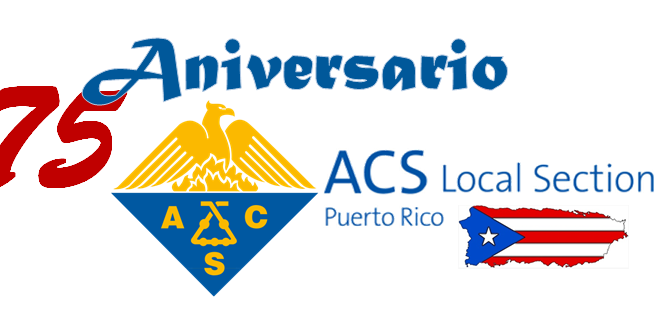University of Puerto Rico
Mayagüez Campus
Chemistry Department
Departmental Seminar
Celebrating the 75th. Anniversary of the ACS of Puerto Rico
Dr. Facundo M. Fernández
Georgia Institute of Technology
Associate Chair for research and Graduate Training, Regents’ Professor
and Vasser-Woolley Chair in Bioanalytical Chemistry.gy
March 31st 2023
10:30 am
Haga clic aquí para unirse a la reunión
ID de la reunión: 219 420 169 602Código de acceso: f5EJWq
Descargar Teams | Unirse en la web
“Next Gen Technologies in Metabolomics: AI/ML, Triboelectric Nanogenerators, Ion Mobility and Imaging”
Facundo M. Fernández1
1School of Chemistry and Biochemistry and Petit Institute of Bioengineering and Bioscience, Georgia Institute of Technology.
The highly dynamic nature of metabolites and their abundances makes metabolomics a powerful endpoint of the ‘omics’ cascade, yielding a molecular profile that is closest to the physiological phenotype. Metabolomic profiles are therefore sensitive to subtle perturbations observed in early disease stages or disease progression, which may be difficult to detect at the proteome or transcriptome levels. Human diseases are multi-factorial in nature, and studying small parts of their associated molecular changes is generally insufficient for understanding the full spectrum of disease phenotypes.
The metabolome is the total collection of biologically-active small molecules with molecular weights lower than about ~1.5 kDa in an organism. This includes endogenous molecules that are biosynthesized by metabolic networks in “primary metabolism”, specialized “secondary metabolite” signaling or defense molecules, molecules derived from diet or environmental exposures (the exposome), and molecules derived from the biosynthetic interactions with associated microbes (the microbiome). Metabolomics can either be “targeted” to a set of known compounds, for example certain lipids, or “non-targeted”, which attempts to detect and relatively quantify as many metabolites as possible.
The vast chemical diversity of the metabolome (lipids, sugars, amino acids, etc.), and its wide dynamic range (mM to fM) implies that no single analytical method can adequately profile all metabolites in a single metabolomics experiment. Along these lines, the “fusion” of mass spectrometry (MS) and nuclear magnetic resonance spectroscopy (NMR) has emerged as one of the most powerful avenues to increase metabolome coverage. Nested separations that work in a time frame compatible with mass spectrometry, such as those performed by ion mobility, are also playing a key analytical role in metabolomics as a way of increasing peak capacity and identifying metabolites through ion mobility collision cross section measurements. Further, localization of metabolites at the tissue level with imaging mass spectrometry experiments, allows linking their abundance with changes observed in biofluids. In this seminar, I will introduce the various applications of machine learning in non-targeted metabolomics experiments, describe potential pitfalls through examples related to our efforts within the Molecular Transducers of Physical Activity Consortium (MoTrPAC), and showcase the challenges involved in identifying unknowns with this growing ‘omics approach.
Biography:
Prof. Facundo M. Fernández received his MSc in Chemistry from the College of Exact and Natural Sciences, Buenos Aires University in 1995 and his PhD in Analytical Chemistry from the same University, in 1999. In August 2000, he joined the research group of Prof. Richard N. Zare in the Department of Chemistry at Stanford University. His work focused on several aspects of Hadamard transform time-of-flight mass spectrometry with an emphasis on capillary-format separation methods. In 2002, he joined the group of Prof. Vicki Wysocki in the Department of Chemistry at the University of Arizona to develop surface-induced dissociation for gas-phase peptide ion studies. In 2004 he joined the School of Chemistry and Biochemistry at the Georgia Institute of Technology where he currently holds the position of Associate Chair for research and Graduate Training, Regents’ Professor and Vasser-Woolley Chair in Bioanalytical Chemistry. He is the author of 200+ peer-reviewed publications and numerous invited presentations at national and international conferences in the field of mass spectrometry, metabolomics and analytical chemistry. He is also the academic director for the mass spectrometry cores at Georgia Tech where he oversees a portfolio numerous mass spectrometers from most major vendors, together with the instruments in his research group. He has received several awards, including the NSF CAREER award, the CETL/BP Teaching award, the Ron A. Hites best paper award from the American Society for Mass Spectrometry, and the Beynon award from Rapid Communications in Mass Spectrometry, among others. He serves on the editorial board of The Analyst and as an Associate editor for the Journal of the American Society for Mass Spectrometry and Frontiers in Chemistry. His current research interests include the field of metabolomics and the development of new ionization, imaging, machine learning and ion mobility spectrometry tools for probing composition and structure in complex molecular mixtures.







